Can you water plants with dishwater? The answer, like many things in gardening, is a bit more complex than a simple yes or no. While dishwater might seem like a convenient and eco-friendly alternative to tap water, it’s essential to consider the potential consequences before dousing your prized plants with soapy suds.
Dishwater contains a mix of detergents, food particles, and minerals that can impact plant growth in both positive and negative ways.
This article explores the composition of dishwater, its effects on plants, and alternative watering methods. We’ll delve into the potential benefits and drawbacks of using dishwater, analyze how different plant species respond to it, and discuss safety precautions to ensure your plants thrive.
Dishwater Composition
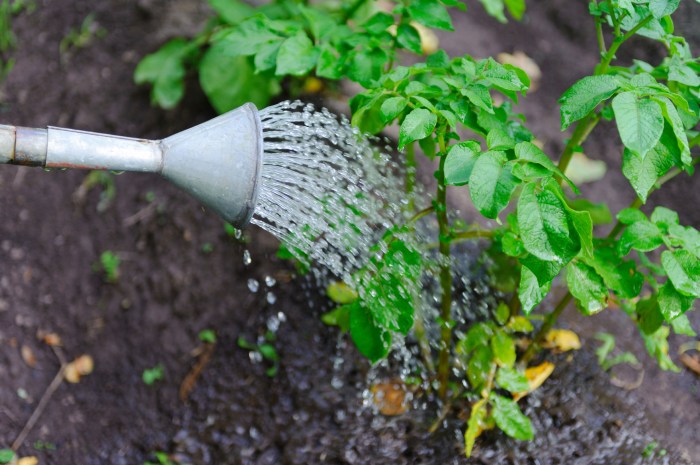
Dishwater, the liquid leftover after washing dishes, is a complex mixture of various components. Understanding its composition is crucial to determine its potential benefits and drawbacks for plant growth.
Typical Components of Dishwater
Dishwater typically contains a combination of water, detergents, food particles, and minerals. The specific composition can vary depending on the type of dishes washed, the detergents used, and the water hardness in a particular area.
- Detergents:Dishwashing detergents are designed to break down grease and food residues. They often contain surfactants, enzymes, and other chemicals that can impact plant growth.
- Food Particles:Dishwater can contain remnants of food, such as carbohydrates, proteins, and fats. These organic compounds can provide nutrients to plants, but they can also attract pests and promote microbial growth.
- Water Hardness:Hard water contains high concentrations of minerals like calcium and magnesium. While these minerals are essential for plant growth, excessive amounts can lead to nutrient imbalances and affect water absorption.
Impact of Dishwater Components on Plant Growth
The components of dishwater can have both positive and negative effects on plant growth.
Potential Benefits
- Nutrient Supply:Dishwater can contain trace amounts of nutrients, such as nitrogen, phosphorus, and potassium, which are essential for plant growth.
- Improved Soil Structure:Some detergents contain ingredients that can improve soil structure, making it easier for roots to penetrate and absorb water.
Potential Drawbacks
- Detergent Toxicity:Dishwashing detergents contain chemicals that can be toxic to plants in high concentrations.
- Salt Buildup:Dishwater can contain high levels of salts, which can accumulate in the soil and inhibit plant growth.
- Pest and Disease Attraction:Food particles and other organic matter in dishwater can attract pests and promote the growth of disease-causing microorganisms.
Plant Response to Dishwater: Can You Water Plants With Dishwater
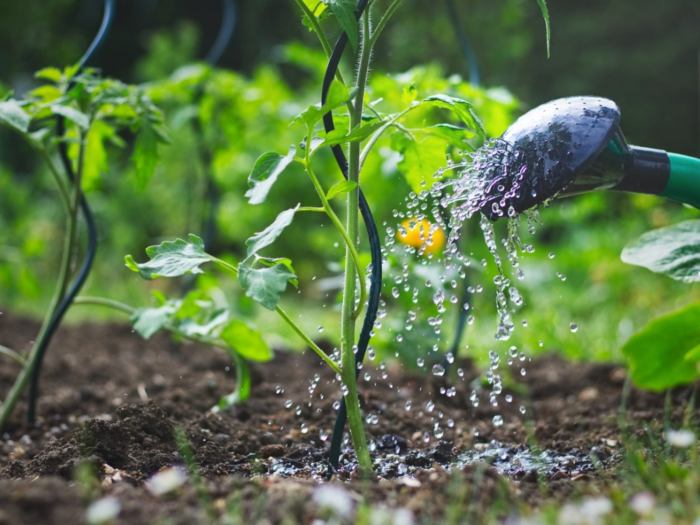
Plants, like all living organisms, require specific conditions for optimal growth and health. While water is essential for their survival, the type and quality of water can significantly impact their development. Dishwater, a common household byproduct, contains various substances that may affect plant life, leading to both positive and negative consequences.
Plant Species Sensitivity to Dishwater
The response of plants to dishwater varies greatly depending on the species. Some plants are more tolerant of the salts and detergents present in dishwater, while others are highly sensitive and can be negatively impacted.
While dishwater might seem like a convenient way to water plants, it’s important to remember that it often contains soap residue and other chemicals that can harm your greenery. If your yard is excessively wet, you might want to consider implementing strategies to improve drainage.
How to Dry Up a Wet Yard: A Comprehensive Guide to Reclaim Your Outdoor Oasis offers helpful tips and techniques for tackling this common problem. Once you’ve addressed drainage issues, you can ensure your plants thrive by using clean, fresh water for irrigation.
- Tolerant Plants:Plants like succulents, cacti, and some ferns have evolved to withstand harsh conditions, including high salt concentrations. These plants can often tolerate small amounts of dishwater without exhibiting significant negative effects.
- Sensitive Plants:Plants like orchids, African violets, and ferns are more sensitive to changes in water quality. They are particularly susceptible to salt buildup and can suffer from stunted growth, leaf discoloration, and root damage if exposed to excessive dishwater.
Dishwater Concentration and Plant Growth
The concentration of dishwater used can significantly influence plant growth. While small amounts of diluted dishwater may not pose a major threat, excessive use or concentrated dishwater can negatively impact plant health.
- Low Concentrations:Diluted dishwater, particularly from hand-washing dishes with mild detergents, may provide some additional nutrients to plants, especially those lacking in certain minerals. However, it is important to note that the concentration of these nutrients is often low and may not significantly impact growth.
While dishwater can contain beneficial nutrients for plants, it’s crucial to consider the potential downsides. Excess soap residue and salts can harm your plants, especially if you’re using harsh detergents. If you’re looking for a more natural approach to fertilizing your plants, consider composting kitchen scraps in your backyard.
Compost tea, made from brewed compost, is a great way to provide plants with essential nutrients without introducing harmful chemicals.
- High Concentrations:Concentrated dishwater, especially from dishwashers or heavy-duty detergents, can be harmful to plants. The high salt content can lead to osmotic stress, where water is drawn out of plant cells, causing wilting and dehydration. Additionally, the detergents can disrupt root function and interfere with nutrient uptake.
Long-Term Effects of Dishwater on Plants
The long-term effects of using dishwater on plants can be complex and depend on factors such as the type of dishwater, the frequency of use, and the plant species. However, some potential long-term consequences include:
- Soil Changes:Dishwater can contribute to soil salinization, a process where salts accumulate in the soil, making it difficult for plants to absorb water and nutrients. This can lead to soil compaction, reduced aeration, and impaired root growth.
- Nutrient Imbalances:Dishwater can introduce excess nutrients, such as phosphorus and nitrogen, into the soil. While these nutrients are essential for plant growth, an excess can lead to nutrient imbalances, which can hinder growth and make plants more susceptible to diseases and pests.
- Toxicity:Some detergents and cleaning agents used in dishwashing contain chemicals that can be toxic to plants. These chemicals can accumulate in the soil and potentially harm plant roots, leading to stunted growth or even death.
Alternatives to Dishwater
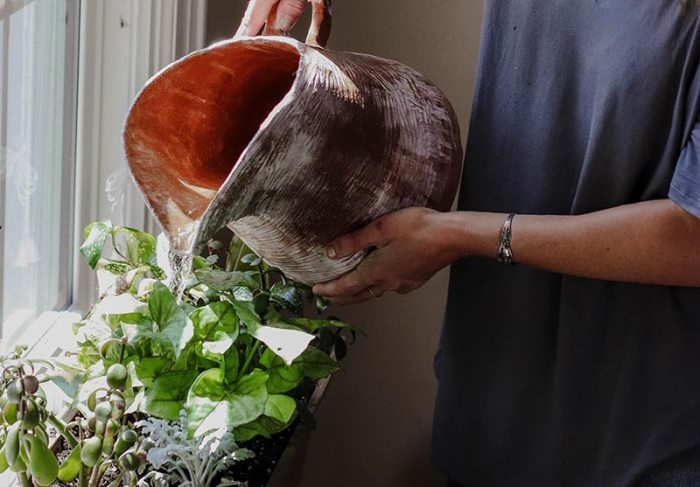
While dishwater might seem like a convenient option for watering plants, it’s essential to consider the potential drawbacks and explore alternative water sources. Understanding the composition of dishwater and its impact on plants, as discussed previously, highlights the importance of exploring safer and more beneficial options.
Comparing Watering Methods, Can you water plants with dishwater
Choosing the right watering method for your plants is crucial for their health and growth. Here’s a comparison of dishwater with other commonly used water sources:
| Method | Benefits | Drawbacks |
|---|---|---|
| Dishwater | Convenient, readily available | High in salts and detergents, can harm plants |
| Rainwater | Naturally soft, ideal for most plants | Can be contaminated with pollutants, availability varies |
| Tap Water | Convenient, readily available | May contain chlorine, fluoride, and other minerals, can be hard |
| Bottled Water | Pure, free of contaminants | Expensive, not environmentally friendly |
Ideal Water Parameters for Plants
The ideal water pH and mineral content vary depending on the plant species. Understanding these parameters can help you choose the best watering method and adjust it accordingly:
| Plant Type | Ideal pH Range | Mineral Content |
|---|---|---|
| Acid-loving Plants (e.g., Azaleas, Rhododendrons) | 4.5
|
Low in calcium and magnesium |
| Neutral-loving Plants (e.g., Ferns, Orchids) | 6.0
While reusing dishwater for plants might seem like a good idea to conserve water, it’s important to consider the potential impact of soap residue. If you’re looking for sustainable ways to enhance your outdoor space, check out our guide on DIY Garden Projects: Transforming Your Outdoor Space with Creativity and Simplicity for eco-friendly alternatives. Ultimately, when it comes to watering your plants, it’s best to stick to clean, fresh water for optimal growth and health.
|
Moderate in calcium and magnesium |
| Alkaline-loving Plants (e.g., Cacti, Succulents) | 7.0
|
High in calcium and magnesium |
Best Practices for Watering Plants
Watering plants effectively requires considering their specific needs and environmental conditions:
| Plant Type | Watering Frequency | Water Quality | Environmental Factors |
|---|---|---|---|
| Succulents | Infrequent, allow soil to dry out completely between waterings | Well-drained, low in salts | Warm, dry conditions, bright light |
| Tropical Plants | Frequent, maintain consistently moist soil | Soft, low in chlorine | Warm, humid conditions, bright indirect light |
| Houseplants | Moderate, allow top inch of soil to dry out between waterings | Filtered, low in minerals | Moderate temperature, moderate humidity, bright indirect light |
Safety and Precautions
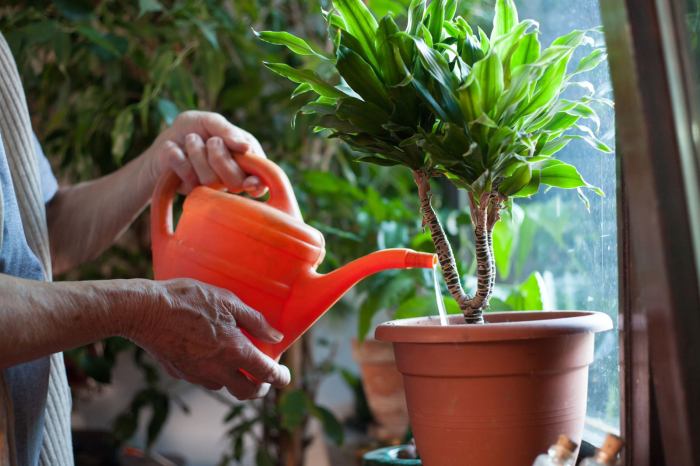
While using dishwater on plants might seem like a harmless way to recycle water, it’s crucial to consider the potential risks and take necessary precautions to ensure the safety of your plants and the environment. Dishwater often contains traces of detergents, food particles, and other chemicals that could harm plants.
It’s important to understand these risks and take steps to mitigate them.
Minimizing Risks from Dishwater
The presence of detergent residue is a primary concern when using dishwater on plants. Detergents are designed to break down grease and food particles, and these chemicals can be toxic to plants in high concentrations.
- Use mild dish soap:Opt for biodegradable and phosphate-free dish soap, as these are less likely to harm plants. Avoid using harsh detergents or cleaners with strong chemicals.
- Thoroughly rinse dishes:Ensure that all dishes are thoroughly rinsed to remove any soap residue before using the water on plants. Residual soap can accumulate in the soil, potentially damaging roots and inhibiting plant growth.
- Dilute dishwater:Mixing dishwater with fresh water can reduce the concentration of detergents and other chemicals. A 1:1 ratio of dishwater to fresh water is a good starting point.
Proper Disposal of Dishwater
While using dishwater on plants can be a sustainable practice, it’s important to dispose of it responsibly to minimize any negative impact on the environment.
- Avoid dumping directly into drains:Dishwater can contain grease and food particles that can clog drains and contribute to wastewater pollution.
- Compost suitable waste:If your dishwater doesn’t contain harmful chemicals, you can use it to water your compost pile. The water will add moisture and nutrients to the compost.
- Use a greywater system:Consider installing a greywater system to collect and treat dishwater for use on outdoor plants. This can significantly reduce your water consumption.
Sustainable Water Usage Practices
Reducing the amount of dishwater generated is essential for promoting sustainable water usage practices.
- Wash dishes by hand:Handwashing dishes can significantly reduce water consumption compared to using a dishwasher.
- Use a dishwasher efficiently:If you use a dishwasher, ensure it’s fully loaded and use the eco-friendly setting to minimize water and energy usage.
- Collect rainwater:Collecting rainwater can provide a sustainable source of water for your plants, reducing your reliance on tap water.
Outcome Summary
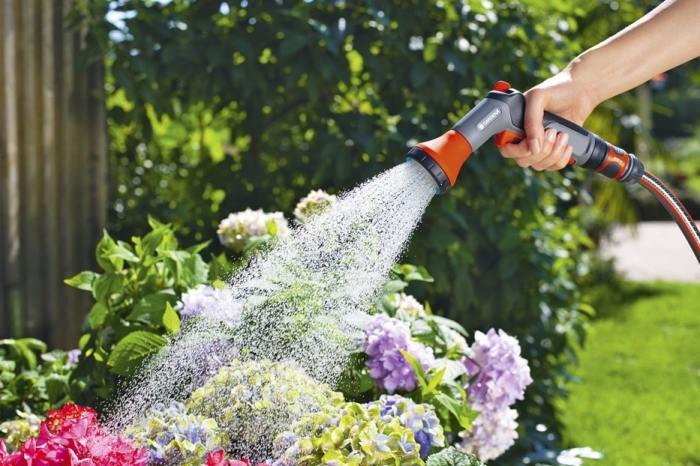
Ultimately, the decision of whether or not to water your plants with dishwater is a personal one. While it can be a convenient and sustainable option in some cases, it’s crucial to weigh the potential risks and benefits carefully. By understanding the composition of dishwater, its effects on plants, and alternative watering methods, you can make an informed decision that supports the health and well-being of your green companions.